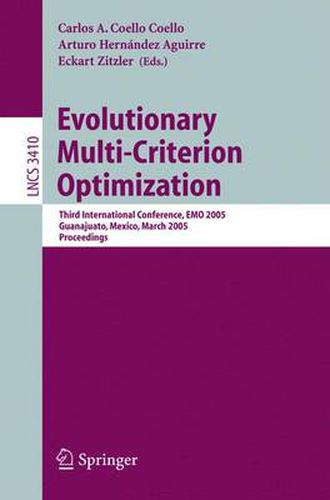Readings Newsletter
Become a Readings Member to make your shopping experience even easier.
Sign in or sign up for free!
You’re not far away from qualifying for FREE standard shipping within Australia
You’ve qualified for FREE standard shipping within Australia
The cart is loading…






This title is printed to order. This book may have been self-published. If so, we cannot guarantee the quality of the content. In the main most books will have gone through the editing process however some may not. We therefore suggest that you be aware of this before ordering this book. If in doubt check either the author or publisher’s details as we are unable to accept any returns unless they are faulty. Please contact us if you have any questions.
Multicriterion optimization refers to problems with two or more objectives (n- mally in con?ict with each other) which must be simultaneously satis?ed. Multicriterion optimization problems have not one but a set of solutions (which represent trade-o?s among the objectives), which are called Pareto optimal - lutions. Thus, the main goal in multicriterion optimization is to ?nd or to - proximate the set of Pareto optimal solutions. Evolutionary algorithms have been used for solving multicriterion optimization problems for over two decades, gaining an increasing popularity over the last 10 years. The 3rd International Conference on Evolutionary Multi-criterion Optimi- tion(EMO2005)washeldduringMarch9-11,2005,inGuanajuato,M’ exico.This wasthethirdinternationalconferencededicatedentirelytothisimportanttopic, followingthesuccessfulEMO2001andEMO2003conferences,whichwereheldin Z.. urich,SwitzerlandinMarch2001,andinFaro,PortugalinApril2003,respectively. The EMO 2005 scienti?c program included two keynote addresses, one given by Peter Fleming on an engineering design perspective of many-objective op- mization, and the other given by Milan Zeleny on the evolution of optimality. In addition, three tutorials were presented, one on metaheuristics for multiobj- tivecombinatorialoptimizationbyXavierGandibleux,anotheronmultiobjective evolutionary algorithms by Gary B. Lamont, and a third one on performance assessment of multiobjective evolutionary algorithms by Joshua D. Knowles.
$9.00 standard shipping within Australia
FREE standard shipping within Australia for orders over $100.00
Express & International shipping calculated at checkout
This title is printed to order. This book may have been self-published. If so, we cannot guarantee the quality of the content. In the main most books will have gone through the editing process however some may not. We therefore suggest that you be aware of this before ordering this book. If in doubt check either the author or publisher’s details as we are unable to accept any returns unless they are faulty. Please contact us if you have any questions.
Multicriterion optimization refers to problems with two or more objectives (n- mally in con?ict with each other) which must be simultaneously satis?ed. Multicriterion optimization problems have not one but a set of solutions (which represent trade-o?s among the objectives), which are called Pareto optimal - lutions. Thus, the main goal in multicriterion optimization is to ?nd or to - proximate the set of Pareto optimal solutions. Evolutionary algorithms have been used for solving multicriterion optimization problems for over two decades, gaining an increasing popularity over the last 10 years. The 3rd International Conference on Evolutionary Multi-criterion Optimi- tion(EMO2005)washeldduringMarch9-11,2005,inGuanajuato,M’ exico.This wasthethirdinternationalconferencededicatedentirelytothisimportanttopic, followingthesuccessfulEMO2001andEMO2003conferences,whichwereheldin Z.. urich,SwitzerlandinMarch2001,andinFaro,PortugalinApril2003,respectively. The EMO 2005 scienti?c program included two keynote addresses, one given by Peter Fleming on an engineering design perspective of many-objective op- mization, and the other given by Milan Zeleny on the evolution of optimality. In addition, three tutorials were presented, one on metaheuristics for multiobj- tivecombinatorialoptimizationbyXavierGandibleux,anotheronmultiobjective evolutionary algorithms by Gary B. Lamont, and a third one on performance assessment of multiobjective evolutionary algorithms by Joshua D. Knowles.